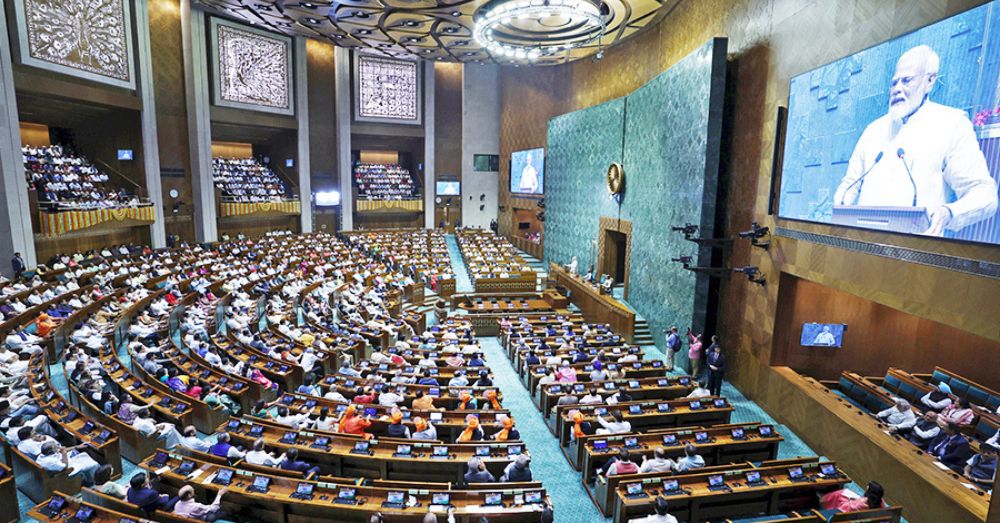If the tokenized ‘special session’ that passed the controversial Women’s Reservation Bill 2023 in September, is set aside, technically the Winter Session in December was the inaugural session of the new Parliament. It is rather disappointing that this inaugural session will go down in the history of India for all the wrong reasons.
Never in the history of independent India have these many members (146) of the Parliament, ironically all from the Opposition parties, got suspended – including one who was not even present in the Lok Sabha. This despite the fact that the floors of the old buildings had witnessed worse chaos from the Opposition parties, especially from the party that now sits on the treasury bench.
Not only did the suspension shun the voices of 35.68 crore people the legislators represented, i.e. about 25 percent of the total population, but also drowned in the well their questions submitted for the government to answer. The questions which are significant tools of the democracy, which could have made way for reform in the governance, and which could have addressed concerns of millions of Indians affected by the issues.
Selective Amnesia
The lawmakers were suspended for seeking answers from the Home Minister for the security breach that happened on December 13. Ironically, the legislator on whose negligence the alleged intruders entered the Parliament premises remains untouched. Similarly, in the case of Mahua Moitra’s expulsion, the former legislator got penalised for sharing her Lok Sabha credentials in the “cash-for-query” allegation.
However, the businessman accused of using the credentials remains untouched. Further, Bharatiya Janata Party’s South Delhi MP Ramesh Bidhudi’s objectionable remarks against a minority MP Danish Ali from Bahujan Samaj Party on Sep 21 in this very new building seeks nowhere similar reaction from the ruling dispensation.
During the inauguration of the new Parliament on May 28, the wrestlers who made India proud in the international fora were peacefully walking towards the building demanding justice. They were manhandled and detained by the Delhi Police; while their alleged culprit, MP Brij Bhushan Singh was enjoying the inauguration ceremony, unmoved.
Ironically, few months later the tokenized inaugural session of the Parliament passed the Women’s Reservation Bill 2023 to give political representation to the women in the country, with no immediate ground impact.
New lows
Our honourable prime minister calls India the mother of democracy. Let’s recall the speech of the former Vice President Venkaiah Naidu at the Virendra Bhatia Memorial Lecture on ‘Pillars of Democracy’ on Dec 8, 2019, where he’d said, “The strength of a democracy depends upon the strength of each pillar (Legislature, Executive, Judiciary and the Media) and the way pillars complement each other”. In the absence of the opposition members and without any debate, the government passed several new laws on the criminal codes, appointment of the election commissioner and the telecommunication regulation, hurriedly before the 2024 general elections.
The process not only undermined the other three pillars but also gave the executive an unprecedented power over the others. That it would have far fetching consequences on the functioning of the democracy, the nation was deprived of its know-how. To all of this, all that the current vice president had to do was a foul cry on the alleged mimicry by a suspended opposition member and an unnecessary correlation to the farmers and the jat community he claims to represent.
If these are the situations in the first eight months of the new Parliament a few years before the country completes the eighth decade of independence, it would have a chilling effect on the upcoming eight decades. The voters must decide the future of this country as they may just have a little more than eight weeks from now.
Swati Dey identifies herself as an avid learner, an independent journalist and a consultant on policies of social justice. She can be reached at ‘mostofswati’ on social media.
